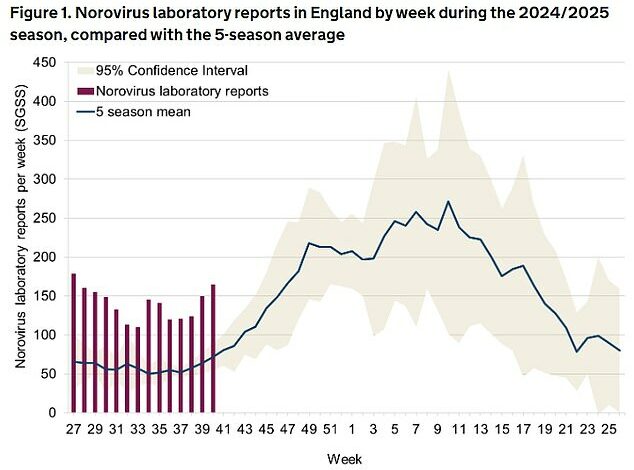Super-norovirus grips Britain: doctor warns against taking regular painkillers




Britons were today warned against taking a commonly used painkilling drug to combat norovirus.
Figures show that the number of cases of the winter vomiting disease, which can also cause diarrhea, has increased by more than 40 percent in just two weeks.
Health bosses fear a further wave of norovirus could put further pressure on the NHS before the winter flu season is even in full swing.
Rest and drinking plenty of fluids are often recommended by health heads. Paracetamol can also help with fever or aches and pains.
But experts have now advised people to avoid Ibuprofen, fearing it could irritate the stomach lining.
The non-steroidal anti-inflammatory drug (NSAID) could even increase the risk of stomach bleeding and ulcers for Britons affected by vomiting.
This is because the drug reduces the production of prostaglandins – hormone-like substances that the body produces – that protect the stomach lining.
Savneesh Bhogal, a healthcare expert at Netex, said: ‘Avoid taking ibuprofen as it should not be taken on an empty stomach – and you may not feel like eating.

Figures released yesterday by the UK Health Security Agency (UKHSA) show that cases of the winter virus have risen by 41 per cent in just a fortnight

Experts have now advised people to avoid Ibuprofen amid fears it could irritate the stomach lining
‘Although ibuprofen should not be taken on an empty stomach as it can disrupt the mucous membranes, paracetamol is safe to do so.
‘There is no treatment for norovirus, so you have to let it run its course.’
According to figures released yesterday by the UK Health Security Agency (UKHSA), this year’s norovirus outbreak is much more virulent than previous seasons.
Cases of the winter bug rose by 41 percent in just two weeks. This is double the five-year average for the same two weeks.
Since the start of the 2024/2025 season, the number of reported norovirus outbreaks in hospitals is also 37 percent higher than the five-year average.
However, the actual case numbers – which only cover England, despite being collected by the UKHSA – could be even higher.
This is because the figures are based on positive laboratory reports and NHS hospitals reporting suspected and confirmed outbreaks of norovirus.
Most infected suffer from nausea, diarrhea and vomiting and recover at home.

Norovirus can resemble the symptoms of Covid, with both viruses causing chills, fever and headache
UKHSA noted that the rise in cases was largely driven by the variant known as GII.17.
The species has been nicknamed ‘Kawasaki’ because it was first discovered in the Japanese city in 2014.
“The increase in the variant has been observed in other provinces and is being closely monitored,” the health agency said.
The bug is spread through close contact with someone who is infected; touching surfaces or objects that have the virus on them, and then touching the mouth; as well as eating food that has been handled by someone with norovirus.
Washing hands regularly is the best way to prevent the spread.
Norovirus can show similar symptoms to the Covid-19 virus, with both viruses causing chills, fever and headache.
The stomach flu usually goes away on its own within two to three days.
But patients, who may also experience sore arms and legs, are advised to stay home until 48 hours after their symptoms have cleared.
However, severe cases may require some people to be hospitalized, while the elderly and children are most at risk.
Gauri Godbole, deputy director of gastrointestinal infections at the UKHSA, said: ‘We are entering the winter season with higher than normal norovirus levels, and we expect norovirus to spread more in the coming weeks.
‘Recently we have seen the greatest increase in cases in adults, especially those aged 65 and over.
‘To help reduce the spread of norovirus, you can take steps to prevent passing on the infection.
‘If you have diarrhea and vomiting, do not return to work, school or nursery until 48 hours after your symptoms have disappeared and do not prepare food for others during that time.
‘If you are feeling unwell, do not visit people in hospitals and care homes to avoid passing on the infection in these settings.’
The rise in cases also comes as a new vaccine is being tested in Britain that could prevent people from developing norovirus.
Moderna’s mRNA vaccine has entered the final phase of testing, the Health Secretary has announced, and results so far show it creates a “strong immune response.”




